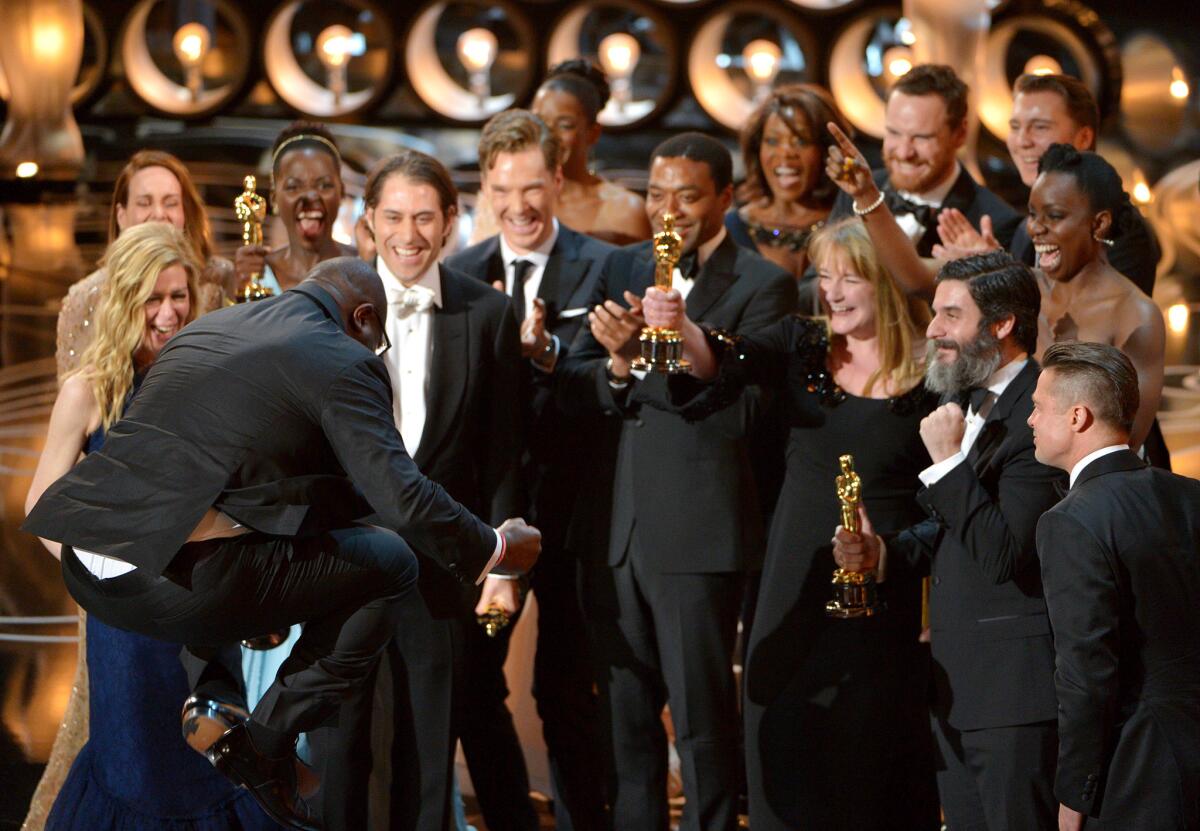The spurious charge that ’12 Years a Slave’ is ‘civil rights porn’

Do yourself a favor: If you care about American politics and race relations and you haven’t already seen “12 Years a Slave,” go see it. You will not be sorry.
The brutal tale of a 19th century American black man’s descent from freedom into slavery deservedly won the best picture Oscar on Sunday. But it hasn’t done nearly as well at the American box office as it should have.
It has grossed about $49 million in the United States, a relatively modest amount compared with multi-Oscar winner “Gravity,” which has taken in close to $270 million domestically.
“Gravity” probably amazed you (and its technical feats were extraordinary), but “12 Years a Slave” will enlighten you and stay with you in ways you cannot begin to imagine.
“It’s important because it deals with our history,” the film’s producer, Brad Pitt, told reporters backstage after winning the night’s big prize, according to my colleague John Horn. “It’s important that we understand our history not for any kind of guilt, but with an understanding of who we were, so we can better understand who we are now. And most importantly, so we can understand who we’re going to be.”
What you will find in the film’s difficult, and intimate, portrayal of the relationship between white slave owners and black slaves is a poetic but cogent explanation for the often poisonous state of race relations in this country even today. The historical burdens of slavery (white privilege, chronic poverty, institutional racism, disenfranchisement, to name a few) have not disappeared just because we have a black president.
In fact, in my travels around the country as a political reporter, I have observed that the election of President Obama has paradoxically unleashed a kind of pent-up racism. In many states, white voters are unabashed about it.
I was shocked into recalling some of my brushes with casual racism on the campaign trail last week while listening to an NPR story about Democrats’ struggles to hold on to the United States Senate. The story centered on Louisiana Democratic Sen. Mary Landrieu, who is running for reelection, and working hard to persuade voters who disapprove of Obamacare, which she supported.
NPR reporter Ailsa Chang found a group of men in Lafourche Parish sitting under an ancient oak tree studded with campaign signs. One man, Al Broussard, told her that he wasn’t planning to vote for Landrieu because of her support for the president’s signature healthcare law. She asked him whether he voted for Obama in 2008, two years before Obamacare was even introduced.
“I don’t vote for black people, lady,” Broussard replied. “No, ma’am. I don’t vote for black people. They got their place. I got my place. That’s the way I was raised.”
Immediately, some conservative media outlets put up a howl: Liberal reporter goes looking for Southern white voter to caricature as a racist, and finds him.
But I can guarantee you, that is not what happened. The man is not an outlier, and hardly an anomaly. Reporters don’t have to scratch hard to find voters who are willing to say as much. Broussard was simply offering his feelings; they happened to be as pure an expression of American racism as you will ever find.
In October, when “12 Years a Slave” was released, a chorus of conservative voices attempted to dismiss it as, in the words of at least one critic, “civil rights porn.” (Did they call “Schindler’s List” “Holocaust porn?”)
The movie puts the lie to the preposterous conservative narrative that American racism is a thing of the past ... because we have a black president.
Among the critics was Sean Hannity, the popular conservative talk show host.
“How many times can you keep bringing [slavery] up after 150 years?” asked Hannity last fall, after the movie was released. According to news reports, he said the movie “draws out and exaggerates the bad parts of slavery the way only Hollywood can” and is “just further proof that Obama’s America is one of sensationalized racial politics.
“Ladies and gentlemen, the president of the United States of America is black, yet I’ve heard more about race in my life than I have since 2008.”
Yes, exactly; this is the point. Race in America is an unfinished conversation. It’s one we must keep having.
You know, until we get it right.
More to Read
Only good movies
Get the Indie Focus newsletter, Mark Olsen's weekly guide to the world of cinema.
You may occasionally receive promotional content from the Los Angeles Times.







